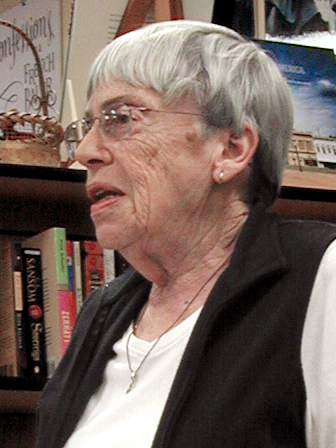Ursula K. Le Guin
Good morning, everyone. Here in New England, it’s a chilly day that feels almost like winter, and the trees have brought up to these hills those that we call “leaf peepers.” But we’ll notice when they’re gone and the roads go strangely quiet.
You’ve probably read of the death of another famous author last year: Ursula K. Le Guin. Much has been written about her work, primarily as a writer of children’s books, science fiction and fantasy. Less discussed in all the tributes was her poetry. All those who didn’t realize she was a glorious poet, raise your hands – or hang your heads, as the case may be.
I had hoped to give you three of her poems here today, but we couldn’t seem to get permission from her publisher, so instead I will tell you about them by briefly reviewing a book that rests in a hallowed place on my shelf: Late in the Day: Poems 2010-2014.
She opens this valuable work with an essay reminding us of what climate science has been telling us, but in her inimitable way says, “One way to stop seeing trees, or rivers, or hills, only as ‘natural resources,’ is to class them as fellow beings – kinfolk.” She goes on to tell us that “Poetry is the human language that can try to say what a tree or a rock or a river is, that is, to speak humanly for it, in both senses of the word ‘for.’ ” She concludes with another essay, this time about form in poetry, explicating the difference between “free verse” and one “in form.” Both would-be and experienced poets would benefit from sharing her thoughts.
The poems I had selected to share with you today are “To Her Task-Master,” “Dead Languages,” and “My Job.” Sad as it is to not give you their full text, here as some lines to absorb and perhaps cherish:
“Old as I am, let me before
I get too old to work at all,
work for you a little more.”
–from “To Her Task-Master”
“The more ways there are to say Mother
the wiser the world is.
Never are there enough
words for Well done! or Welcome!”
–from “Dead Languages”
And from “My Job”:
“Since keeping house and raising kids
don’t count as jobs, I only ever had one.
I started out as a prentice
at five years old, and at near eighty-five
in most ways I still am one ….”
Don’t be misled by the simplicity of these. Find and read the book, and all the poems. They’re profound, especially when she says at the end of “My Job” “I am glad to have worked for this company.”
The book was published in 2016 by PM Press in Oakland, California.
–Irene Willis
Poetry Editor

